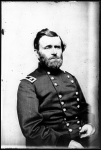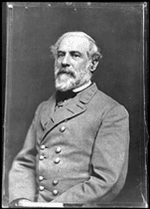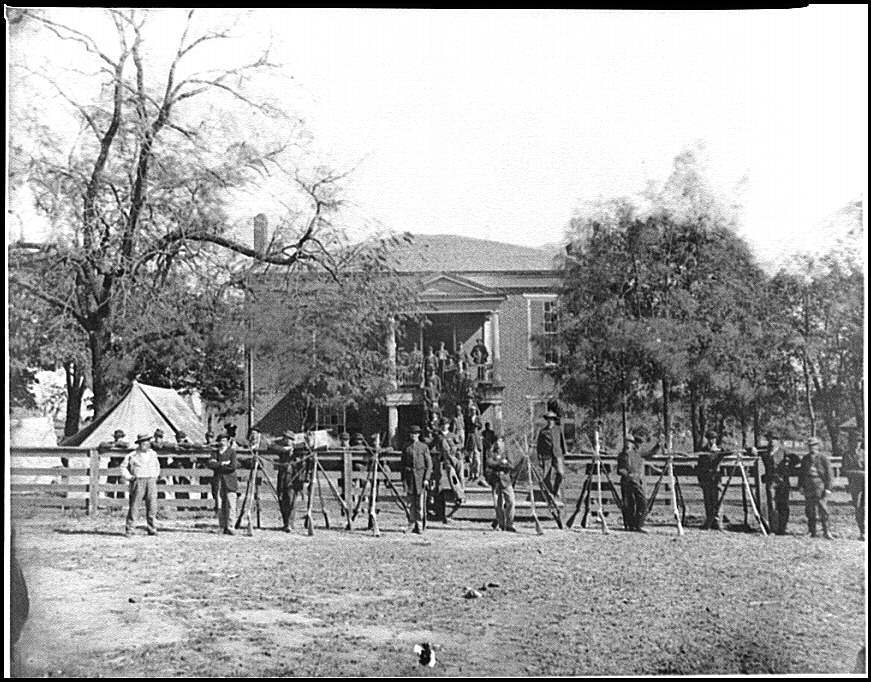 Appomattox
Courthouse Surrender Appomattox
Courthouse Surrender 
|
|
|
April 9, 1865
General Robert
E. Lee was surrounded. He knew it was over. The Confederates
were largely outnumbered with only 100,000 men. |
| “There is nothing
left for me to do, but to go and see General Grant and I would rather die
a thousand deaths.” |
| Lee was questioned
by many of his men about his decision. What would history say about
this surrender? Lee responded, |
| “It is our duty to
live; for what will become of the women and children of the South if we
are not there to support and protect them?” |
| It was a difficult
act, and he reassured them that he would take full responsibility, and
then dispatched the white flag. In all the hours they put into fighting,
it was suddenly over. |
| Grant remained silent,
but his wretched headache was surprisingly gone. |

This picture shows soldiers standing
in front of the Appomattox Courthouse
|
| When Lee reached the
Appomattox Courthouse, he showed up in a magnificent, crisp gray uniform,
and a beautiful jewel stunned sword. Lee thought, |
| “If I am to be Grant’s
prisoner, I must make my best appearance.” |
| The general waited
for Grant for at least a half an hour before he finally showed up.
Grant was wearing a private’s dirty shirt and everything from the waist
down was down was covered in mud. He held no sword. |
| After the two men
shook hands, Grant sat down to tell Lee of his terms of the surrender.
Lee then asked for those terms to be written down on paper. After
Grant was done he read them over. The conditions were; the officers were
allowed to keep their side arms, private horses and personal baggage.
Lee was most pleased with the terms, for he expected much harsher conditions,
and immediately accepted. |
| When that discussion
was over the two began talking about “old times” and friends in the
army. Grant said, |
| “Our conversation
grew so pleasant that I almost forgot the object of our meeting.” |
| Then there was a great
pause. Lee finally broke that by asking if the animals in his cavalry and
artillery were regarded as private property or the governments. Grant
replied to his question saying that they belonged to the government and
that was agreed. Grant then asked Lee if they needed any food, and
if so how much. Lee did so Grant offered him 25,000 rations. |
| After all was over
Grant followed Lee out and said that he remembered feeling, |
| “Sad… and depressed
at the downfall of a foe who had fought so long and valiantly and had suffered
for so much, though that cause, I believe, was one of the worst for which
people ever fought.” |
| When the Union troops
were informed that the surrender had been signed they began to cheer. Immediately
Grant ordered them to stop. He said, |
| " It is wrong to cheer for the defeat
of one's own countrymen." |
| Officers of the Confederacy
sat on their horses watching Lee leave; one man called out, |
| “I love you just as
well as ever, General!” |
|
|
|
BIBLIOGRAPHY
|
|
Books
Geoffrey C. Ward, "The Civil War", Alfred
H. Knope Inc., copywrite 1990
William Loren Katz, "An Album of the civil
War", Franklin Watts Inc., copywrite 1974 |
Websites
John Russell Young, "Around the World with
General Grant", copywrite 1879, "Ulysses s. Grant Talks About Appomattox",http://www.mscomm.com/~ulysses/page45.html,
10/16/00
"Ulysses S. Grant and Robert E. Lee",http://www.mscomm.com/~ulysses/page125.html,10/16/00
|
|
| Hailey Hoobler |
| 8th Grade |
| 2000-2001 |
 Appomattox
Courthouse Surrender
Appomattox
Courthouse Surrender

